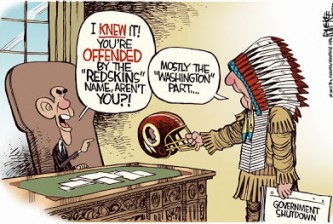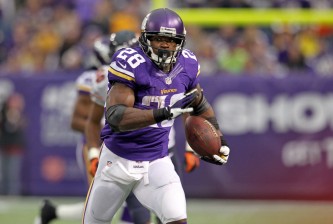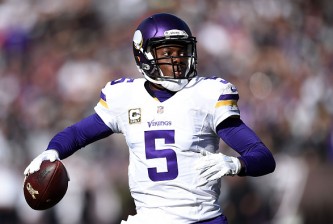
Dominos fall quickly in the NFL. The Green Bay Packers were widely assumed to be using their franchise player tag on TE Jermichael Finley, and let in-demand backup quarterback Matt Flynn walk. Those circumstances changed dramatically when Ted Thompson came to a two-year agreement with Finley. Within minutes of the announcement of that news, Packers beat reporter Tom Silverstein turned the spotlight to Flynn.
@TomSilverstein: I anticipate the #Packers using the franchise tag on Flynn now. They’ll take the $14 million cap hit and then deal him to somebody.
Parsing the rumors floating around online, that unnamed “somebody” essentially boils down to one of two teams – the Seattle Seahawks or the Miami Dolphins. Acquiring Flynn for a big-dollar contract based on his paper-thin body of work already seemed like a risky proposition. Sending high draft picks to Green Bay in the process makes the Kevin Kolb deal look positively sane by comparison.
(How goofy was that deal for Kolb? Arizona can’t shake the Matt Flynn rumors this offseason. Could any team really pull off two high-risk trade-and-signs for someone else’s benchwarmer in two years?)
For history’s sake, let’s see where Flynn ranks among recent backups who were acquired to become starters, and for what cost.
1995: Mark Brunell traded to Jacksonville for a 3rd and 5th round pick.
Brunell, a fifth-round pick in 1993, was Brett Favre’s backup in Green Bay for two seasons, throwing a total of 27 passes in the pros when the expansion Jaguars made a deal to acquire him as their starter. Brunell’s success (making it to the AFC Championship game in year 2) helped push up the price tag for future deals like this.
2001: Matt Hasselbeck traded to Seattle for an exchange of 1st round picks, plus a 3rd rounder.
Hasselbeck had a strong supporter in Mike Holmgren, who had drafted him as Favre’s backup in 1998 and migrated to coffee country the following year. Like Brunell, Hasselbeck had only thrown a handful of passes (29 to be exact) before being put in trade talks. Despite giving up a first rounder in the deal, Seattle didn’t pay too heavy a price. They had the 7th and 10th picks in that draft, and sacrificed the 10th pick for the Packers’ 17th, which they turned into potential Hall of Fame caliber guard Steve Hutchinson.
Hasselbeck himself was either overrated or underrated as a passer for most of his career, depending on who you talked to. But as far as deals go, the Seahawks got a solid long-term starter for a couple handfuls of draft value points.
2004: Matt Schaub traded to Houston for an exchange of 1st round picks, plus a pair of 2nd rounders.
Houston was in pretty desperate straits after the David Carr experiment had finally ground to a merciful halt. They targeted a relatively high-profile backup in Matt Schaub, a former third-rounder who had thrown 161 passes (along with 6 TDs and 6 INTs) over three seasons in Michael Vick’s stead. The Texans paid a hefty price in 2nd round picks, often the most valuable in the draft, and swapped down two spots from #8 overall to #10 to make the deal work.
2009: Matt Cassel (and Mike Vrabel) traded to Kansas City for a 2nd round pick.
Cassel offers a nearly exact comparable to Flynn’s situation, at least from a contract standpoint. After spending seven total years on the bench – four at USC, three in New England – Cassel’s name was finally called in relief of Tom Brady. Fully steeped in Josh McDaniels’ offense, Cassel threw for 3,693 yards, 21 TDs and 11 INTs and led the Patriots to an 11-5 record… but amazingly, no playoff spot. Here, the timeline gets a little dicey.
On January 5th, 2009, it was reported that GM Scott Pioli would place the franchise tag on Cassel to keep him out of reach while the team worked out a deal. Less than ten days later, Pioli was hired as GM of the Kansas City Chiefs. On February 5th, the Pats officially placed the tag on Cassel. February 28th, Pioli consummated the deal to bring him to western Missouri.
The deal was relatively friendly in terms of picks, compared to these others, though whether that was a reflection on Cassel’s contract requirements or just a gentleman’s agreement between Pioli and Belichick is unknown. Regardless, Cassel was still an unrestricted free agent, and that July Pioli signed him to a six-year $63 million megadeal.
(Note: Thanks to @TheSteelersNat for the reminder on Cassel.)
2011: Kevin Kolb traded to Arizona for a 2nd round pick and former first-rounder Dominique Rodgers-Cromartie.
The success of Brunell pushed up the price tag for Hasselbeck, whose success pushed up the price for Schaub, whose success pushed up the price for Kolb. Kolb’s experience in the league – four years played, 7 games started, and more than 300 passes thrown – made for a double-edged sword for the Cardinals, who felt obliged (by Kolb’s agent) to sign the quarterback to a long-term deal.
By comparison with these players, Flynn has thrown fewer passes than Schaub (132), but played just as long as Kolb, putting the team that acquires him in immediate contract jeopardy. The Packers are apparently willing to up the ante by putting the franchise tag on him, apparently being willing to pay him $14 million dollars to sit on the bench if no one bites. (In case you were wondering, Aaron Rodgers is scheduled to make $8 million this season.)
Regardless of Kolb’s lukewarm start, the price tag in these deals keeps rising. Is Flynn worth a first round pick and a huge contract to any team? Joe Philbin and Stephen Ross in Miami just might have something to say about that.






















